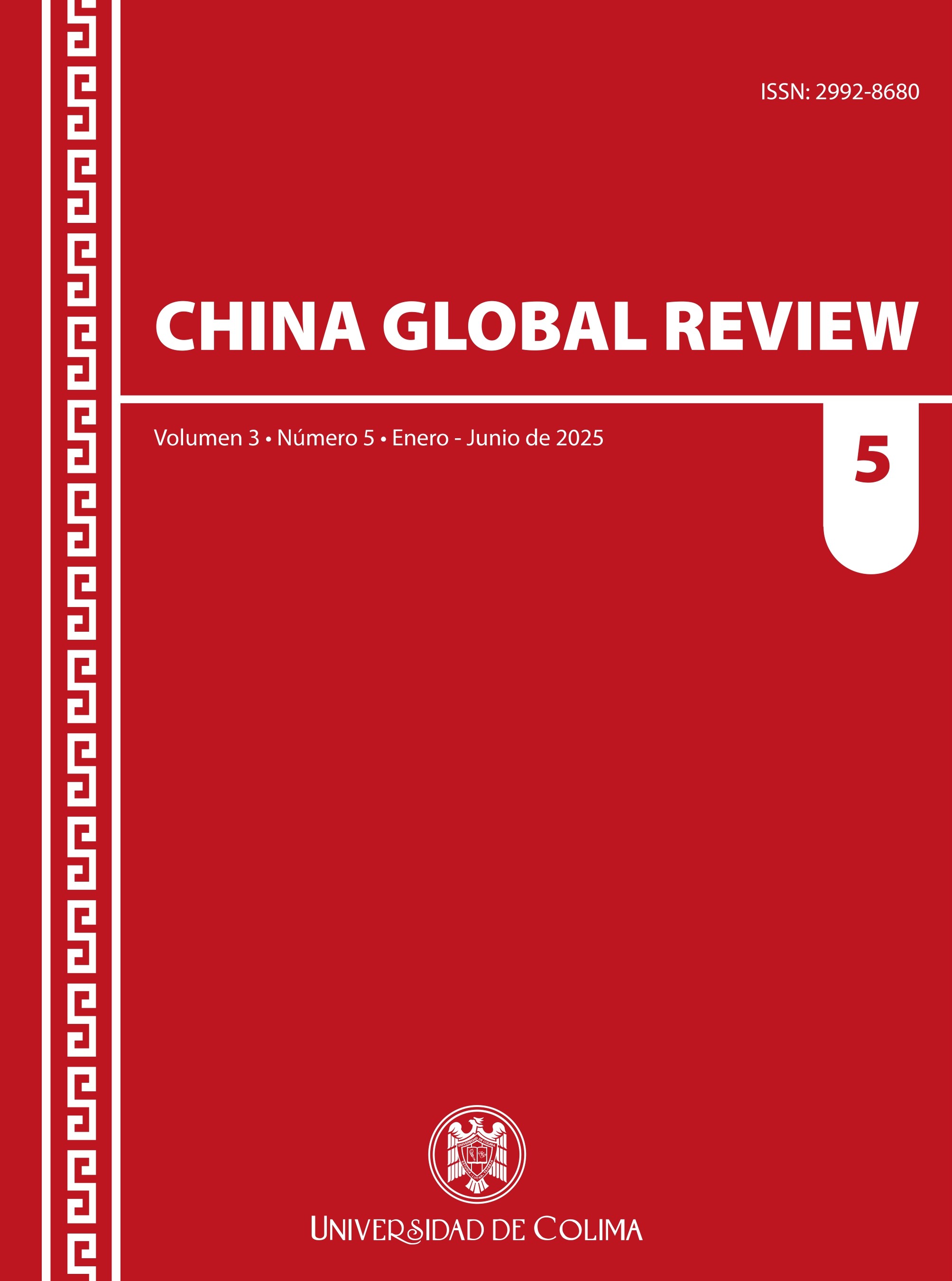Bandung 1955 and the Five Principles: Understanding China through its words
DOI:
https://doi.org/10.53897/REvChinaGR.2025.05.01Keywords:
China, International cooperation, Maoism, Bandung Conference, International relationsAbstract
On the 70th anniversary of the Five Principles of Peaceful
Coexistence and the 1955 Bandung Conference, this article analyzes the role of the People’s Republic of China in that historic event. Through a historical and discourse-oriented approach, it examines how the Chinese delegation, led by Zhou Enlai, articulated an anti-hegemonic narrative grounded in sovereignty, non-interference, and peaceful cooperation. It is argued that this intervention not only influenced the drafting of the Ten Principles of Bandung but also laid ideological and normative foundations for future South-South Cooperation. Furthermore, China’s participation is connected to Mao Zedong’s foreign policy and Maoism as a source of inspiration for emancipatory processes across the Global South. The study draws on
primary sources from the conference and relevant scholarly literature, offering a critical re-reading of Bandung’s diplomatic and symbolic legacy in international history and in China’s global projection.
Downloads
Metrics
References
Acharya, A. (2021). From Heaven to Earth: The “Real” Making of the Modern International Order. Cambridge University Press.
Adelman, J., y Prakash, G. (2022). Bandung and the Making of the Third World. Harvard University Press. https://doi.org/10.5040/9781350277380
Alexander, J. C. (2011). Performance and Power. Polity Press.
Arco Escriche, I. (2024). El Sur Global en la política exterior de China: De Mao a Xi. En Anuario Internacional CIDOB 2025 (pp. 66–68). CIDOB.
Ayllón, B. (2013). La Cooperación Sur-Sur y triangular: ¿Subversión o adaptación de la cooperación internacional? IAEN.
Bradley, M. P. (2010). Decolonization, the Global South, and the Cold War, 1919–1962. En C. Lee (Ed.), Making a World after Empire: The Bandung Moment and Its Political Afterlives (pp. 464–485). Ohio University Press. https://doi.org/10.1017/CHOL9780521837194.023
Chakrabarty, D. (2010). The Legacies of Bandung: Decolonization and the Politics of Culture. En C. Lee (Ed.), Making a World after Empire: The Bandung Moment and Its Political Afterlives (pp. 485–508). Ohio University Press.
Cuadro, M. (2010). De identidades y Relaciones Internacionales: Crítica al constructivismo, relaciones de poder y el lugar de los intereses nacionales. En Actas del V Congreso de Relaciones Internacionales. Universidad Nacional de La Plata.
De Castro, D. (2024). China and Latin America’s renewable energy transition: Investment, resistance, and the Bandung spirit. Third World Quarterly, 45(2), pp. 255–273.
Gray, K., y Gills, B. K. (2016). Cooperación Sur-Sur y el ascenso del Sur Global. Third World Quarterly, 37(4), pp. 557–574. https://doi.org/10.1080/01436597.2015.1128817
Haug, M., Braveboy-Wagner, J., & Maihold, G. (2021). The “Global South” in the Study of World Politics: Examining a Meta Category. The Global South, 15(2), pp. 1–22.
Holzscheiter, A. (2014). Between Communicative Interaction and Structures of Signification: Discourse Theory and Analysis in International Relations. International Studies Perspectives, 15(2), pp. 142–162. https://doi.org/10.1111/insp.12005
Lanteigne, M. (2019). Chinese Foreign Policy: An Introduction (4th ed.). Routledge. https://doi.org/10.4324/9780429437908
Liu, H. (2022). China engages the Global South: From Bandung to the Belt and Road Initiative. Global Policy, 13(S3), pp. 24–32. https://doi.org/10.1111/1758-5899.13102
Lovell, J. (2021). Maoísmo: Una historia global. Debate.
Neumann, I. B. (2008). The body of the diplomat. European Journal of International Relations, 14(4), pp. 671–695. https://doi.org/10.1177/1354066108097557
Qin, Y. (2018). A Relational Theory of World Politics. Cambridge University Press. https://doi.org/10.1017/9781316869505
Slipak, A. (2014). La alianza chino-latinoamericana. Encrucijadas y desafíos para una inserción autónoma en el sistema mundial. Ciccus.
Xi, J. (2024). Llevar Adelante los Cinco Principios de Coexistencia Pacífica y Construir de la Mano la Comunidad de Futuro Compartido de la Humanidad. Conferencia por el 70º Aniversario de los Cinco Principios de Coexistencia Pacífica. Beijing. Ministerio de Relaciones Exteriores de China: https://www.fmprc.gov.cn/esp/wjdt/zyjh/202406/t20240628_11443872.html
Zhao, S. (2020). China’s Foreign Policy Making Process: Players and Institutions. En D. Shambaugh (Ed.), China & The World (pp. 85–110). Oxford University Press. https://doi.org/10.1093/oso/9780190062316.003.0005
Zhou, W., y Esteban, M. (2018). Beyond balancing: China and the future of Asia. The Pacific Review, 31(2), pp. 137–150. https://doi.org/10.1080/09512748.2017.1357657
Discursos y documentos
Ministerio de Asuntos Exteriores de Indonesia. (1955). Final Communiqué of the Asian-African conference of Bandung. Luxembourg Centre for Contemporary and Digital History: https://www.cvce.eu/en/obj/final_communique_of_the_asian_african_conference_of_bandung_24_april_1955-en-676237bd-72f7-471f-949a-88b6ae513585.html
Zhou, E. (1955). Discurso en la Conferencia de Bandung. Marxists Internet Archive: https://www.marxists.org/espanol/zhou/1955/abril-a.htm
Published
How to Cite
Issue
Section
License
Copyright (c) 2025 Sofía Bertinat

This work is licensed under a Creative Commons Attribution-NonCommercial-ShareAlike 4.0 International License.
China Global Review permite compartir, copiar y redistribuir el material en cualquier medio o formato; adaptar, remezclar, transformar y construir sobre el material, dando crédito a la obra de manera adecuada y proporcionando un enlace a la licencia, indicando si se han realizado cambios.









